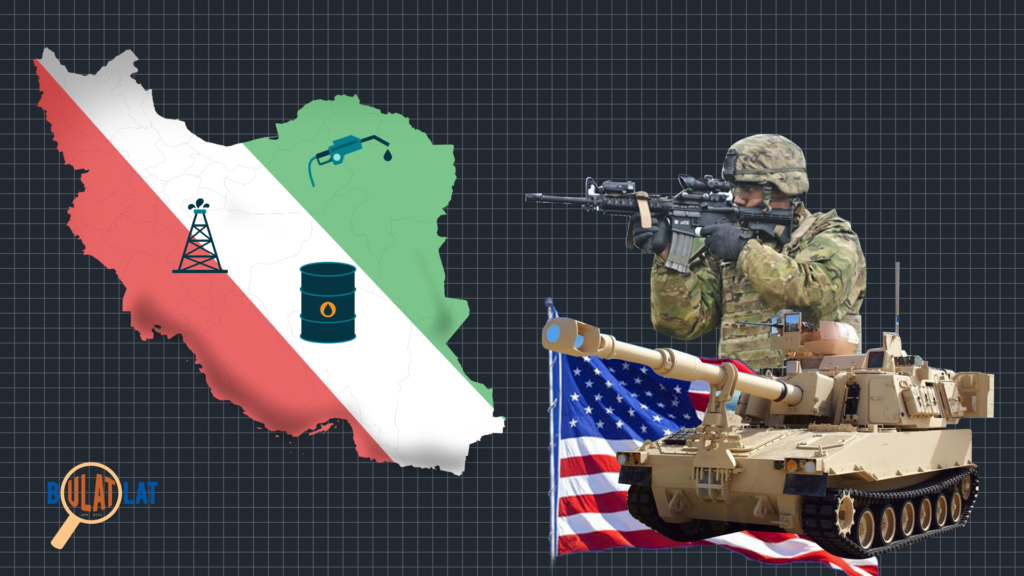Soleimani’s assassination clearly has no basis in any rhetoric of “self-defense” from the Pentagon. He was another casualty in an effort by the US to exert political control in the region, and assert dominance over its sphere of influence.
By JUSTIN UMALI
Bulatlat.com
The assassination of General Qassem Soleimani by the United States is hardly the opening wound in US-Iran relations, nor should it come off as shocking, given the complex relationship between the two nations.
What is clear, however, is that Soleimani’s assassination is the latest manifestation of US imperialism in the Middle East, consistent with its character as an imperialist nation. Beyond bold statements and American bravado, any analysis of the US-Iran conflict must look at what both nations are and the material conditions that push them to act.
In 1917, Russian revolutionary Vladimir Lenin wrote Imperialism, the Highest Stage of Capitalism, and described how the push for profit drives nations into war and plunder. These motivations still ring true today, and the book becomes a useful guide to help us better understand US-Iran relations.
Defining imperialism
What is imperialism?
As Lenin pointed out, the very nature of capitalist society gave rise to imperialism. Capitalism encourages market competition, which eventually creates specialized industries led by monopolies. This arrangement is unstable, and monopolies must continue to expand in order to stay competitive. Monopoly capitalism, according to Lenin, experiences cycles of crisis.
Monopoly capitalism creates crises of overproduction, where more products are being created than what is sustainable. This drives their respective nations to resolve these crises by seeking out other markets to sell surplus product, as well as to exploit their natural resources to fuel their monopolies.
This arrangement, Lenin said, is imperialism – capitalism driving nations to compete with and exploit other nations. This competition between nations is key to imperialism. Lenin points out that events such as the Scramble for Africa and the First World War happened not due to patriotism but due to purely economic factors.
We see this competition between imperialist nations today. The United States is the current leading imperialist and as such exerts control over countries under its sphere of influence. The US is a deciding factor in Middle Eastern affairs, using both overt and covert means to exert political control.
The case with Iran
It should then come as no surprise that the real reasons behind continuing US involvement in the Middle East are economic, despite altruistic claims of “keeping regional stability”. The Middle East is one of the world’s richest regions in terms of oil. Iran itself has the third largest oil reserves in the world and is fourth in oil production.
The United States has had an interest in Iranian oil since the end of the Second World War, which saw a wave of nationalism sweep through Iran. In March 1951, the Iranian parliament led by Prime Minister Mohammad Mossadegh voted to nationalize the then British-controlled Iranian oil industry, a move widely supported by the majority of the Iranian people.
The British were unhappy with the decision and responded with economic sanctions, urging all nations to boycott Iranian oil. This crippled the Iranian economy and fermented unrest among the people, allowing the United States to stage a coup to depose Mossadegh and replace him with a pro-American puppet, the Shah of Iran.
The Shah protected American interests, allowing American oil companies to take over Iranian oil fields for profit. This arrangement lasted from 1953 until 1979, until the Shah was deposed via a nationalist coup with saw the rise of anti-Americanism and state of affairs which exists today.
Contextualizing Soleimani
Since then, we have seen the United States exhaust all means to try and make Iran buckle. It has supported Iran’s enemies such as Saddam Hussein in Iraq and the royal family of Saudi Arabia at the cost of regional stability. It has continued to levy sanctions under the guise of objecting to its nuclear arms program, and it has accused Iran of supporting extremists, despite the fact that it was the United States who allowed the Taliban, Al-Qaeda, and eventually ISIS, to exist in the first place.
Iran, as a regional power, threatens the United States’ sphere of influence in the Middle East, not because the nation is part of an “axis of evil”, but because Iran directly threatens US economic interests. As Lenin points out in Imperialism, wars become inevitable so long as nations are fueled by capitalist greed.
Soleimani’s assassination clearly has no basis in any rhetoric of “self-defense” from the Pentagon. He was another casualty in an effort by the US to exert political control in the region, and assert dominance over its sphere of influence.
Lenin’s work provides us a blueprint of how the age of imperialism works, which is necessary if we are to understand the interactions between the United States and its regional “allies” and Iran. Lenin also reminds us that imperialism, and the capitalist system which props it up, is doomed to fall – we can already see this in the Middle East as well, as the blowback from Soleimani’s death unravels the yarn of violence that the Americans have sown.
Sources:
Vladimir Lenin, “Imperialism, the Highest Stage of Capitalism” (1917), via marxists.org
United States Department of Defense, “Statement by the Department of Defense” (2020)
The Latin Library, “Operation Ajax (1953)”
AP News, “Iran discovers new oil field with over 50 billion barrels”, (2019)
New York Times, “U.S. Secretly Gave Aid to Iraq Early in Its War Against Iran”, (1992)
Politico, “Congress Is Helping Saudi Arabia Destabilize the Middle East. It Needs to Stop.” (2019)
The post The complicated relationship between Iran and US imperialism appeared first on Bulatlat.

